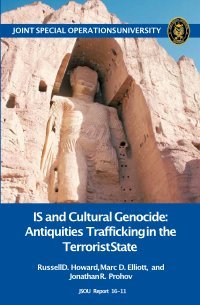By Russell D. Howard, Marc D. Elliott, and Jonathan R. Prohov
In this monograph, the authors offer compelling research that reminds government and military officials of the moral, legal, and ethical dimensions of protecting cultural antiquities from looting and illegal trafficking. Internationally, states generally agree on the importance of protecting antiquities, art, and cultural property not only for their historical and artistic importance, but also because such property holds economic, political, and social value for nations and their peoples. Protection is in the common interest because items or sites are linked to the common heritage of mankind. The authors make the point that a principle of international law asserts that cultural or natural elements of humanity’s common heritage should be protected from exploitation and held in trust for future generations. The conflicts in Afghanistan, and especially in Iraq and Syria, coupled with the rise of the Islamic State (IS), have brought renewed attention to the plight of cultural heritage in the Middle East and throughout the world.
MacDill Air Force Base, Florida: Joint Special Operations University Press, 2016. 112p.



